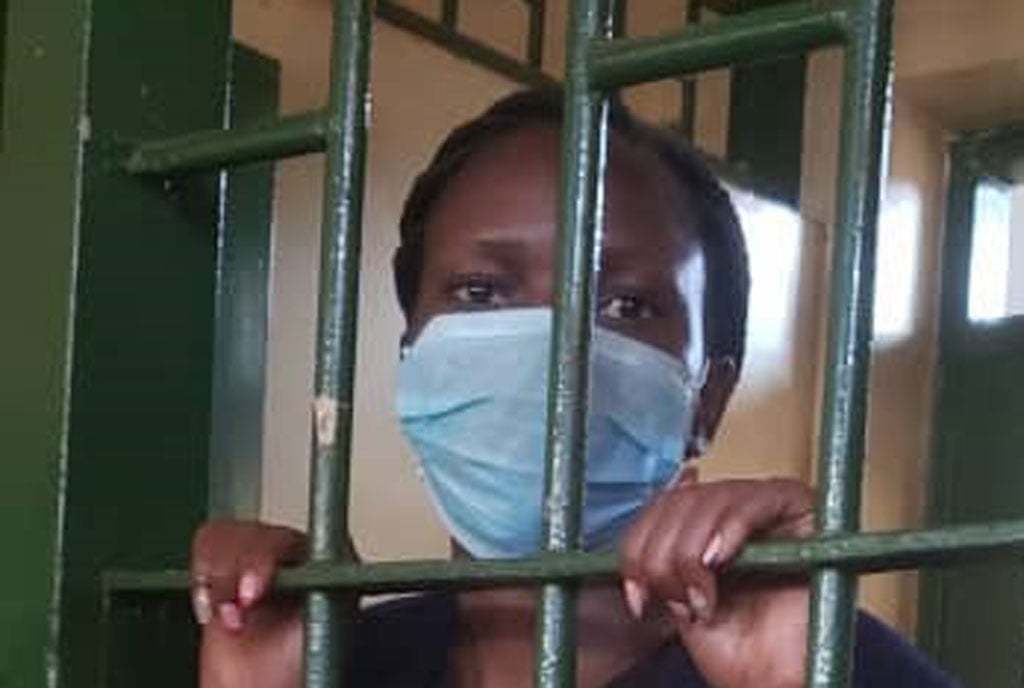
Kennedy Makana Ndyamuhaki (circled) with other protesters at Buganda Road Court on July 31 shortly before they were released on bail. PHOTOS/COURTESY of MAKANA
Kennedy Makana Ndyamuhaki, 21, found himself among those who were arrested and whisked away to Kampala Central Police Station (CPS) to record a statement.
Defiant, he refused to record any statement without the presence of a lawyer. His persistence earned him slaps from a police officer.
“As he cocked his gun, the police officer said I would see what would happen at nightfall.
He said even if he shot me, nobody would ask him questions,” Makana said.
Despite the threats, Makana stood his ground and refused to comply with the orders. A couple of hours later, even without recording any statement, Makana was ushered into Buganda Road Chief Magistrates’ Court in Kampala, where he was charged with being a common nuisance and was remanded to Luzira prison until July 31.
“I was more relieved with being taken to Luzira prison than staying in a police cell [at CPS] or remaining in the hands of police officers. I knew I would be safer inside Luzira,” he says.
Luzira, a place of mixed feelings
A 2022 graduate of UMCAT School of Journalism and Mass Communication in Kampala, Makana was jailed with several colleagues.
On the first night of their arrival, the new inmates underwent the mandatory handing in of whatever they had gone with to prison and undergoing a thorough body check.
Since the prison’s uniforms were few, the new inmates were allowed to remain in their civilian clothes.
Afterward, Makana was taken to Ward C5 to spend the night, only to be told later that he would spend the rest of his days in prison in Ward C5.
“It was so crowded that every night, each of the 108 inmates had to lie on one side as there was hardly any space for turning around,” he told Daily Monitor in an August 8 interview.
Little heroes
Something unusual then happened in the days that followed when word went around the prison that Makana and his colleagues had been jailed for protesting against corruption.
Soon, some inmates began referring to them as heroes.
And because of their actions, Makana said no one bullied him. “Instead, the prisoners are applauding me for standing up in the fight against corruption,” he said.
But some of the inmates failed to understand what a young man of his age was doing inside prison.
“My youthful appearance gave me away. Anyone inside the facility could tell how young I was,” he says.

Kennedy Makana Ndyamuhaki
Some walked up to him and said: “We are fighting hard to get out of here, but you’re instead fighting to be in here.”
Several times, Makana downplayed their comments because he felt they did not understand his fight.
“Yes, I am young but I have to fight for the soul of this country. People keep telling us to go and study hard in school, but where are the jobs? And you want me to fold my hands. The situation in this country will not change when we don’t put up a fight for ourselves.”
Like other inmates, Makana’s family had initially raised concerns before the July 23 demonstrations.
They were anxious about how the events of the march would turn out for him and the family.
Though worried, his mother respected his decision believing that her son was fighting for a greater cause.
But one experience will also live on with Makana, the awful food in Luzira. Posho and boiled beans are the staple course for both lunch and supper.
Makana says from time to time, they have to be counted, a routine he detested.
“We’re required to squat every time counting is done. The process hurts the knees a lot, especially if one is not used to it,” he says.
Lessons Regardless of what he faced in prison, Makana says he picked a few valuable life-changing lessons from the facility.
“One fundamental lesson I learned from this whole experience is how easy it is to go to Luzira. One minute you are out here enjoying your freedom and the next minute, you are in a confined facility living under peculiar conditions. What a shocker that was despite the fact I knew that somehow my involvement in the protests would land me in there,” he says.
Based on this experience, Makana advises Ugandans outside prison not to take their lives for granted because many inmates are wishing, hoping, and praying to get out to be reunited with their loved ones.
What next?
Makana is currently out on bail following his July 31 release. He is expected to return to court on September 5.
He vows to continue fighting and holding leaders in power accountable for their actions.
“This is not the kind of country I want to be living in during my coming years. Things are falling apart, and our leaders are hardly taking notice and action. This is why, as Ugandans, we need to fight for ourselves,” he concludes.
What the police say
Mr Kituuma Rusoke, the Uganda Police spokesperson advises suspects complaining of being beaten during their stay in cells to raise their issues to the Police Professional Standards Unit.








